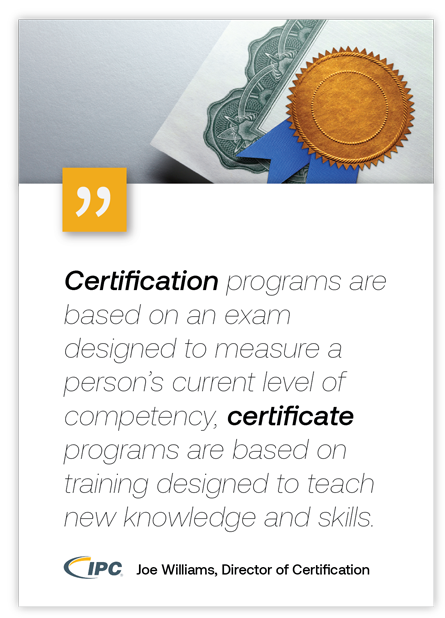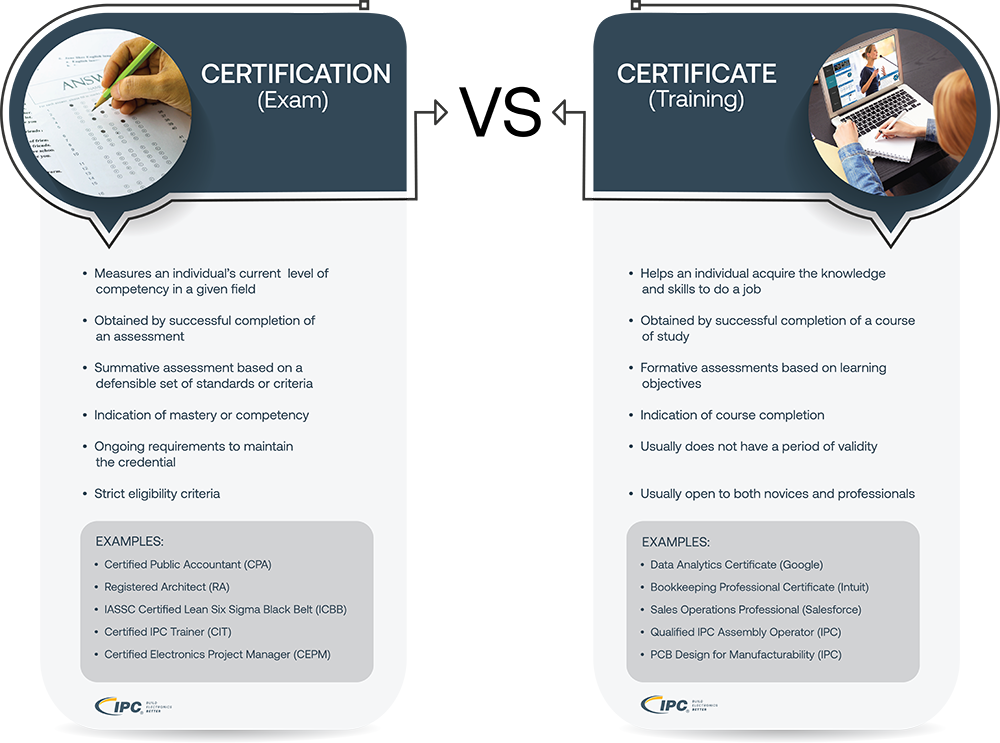Certificate vs Certification: Which is Right for Me?
This blog post is also available in Spanish.
The terms “certification” and “certificate” are often used interchangeably, but in the world of credentials, there are well-defined differences. These differences have important implications for when and how your organization invests in training and validation programs. In part 1 of this series, we’ll break down the meaning and characteristics of each term. In part 2, we’ll explain how you can leverage each credential to achieve your goals.
CERTIFICATION

A certification is a document issued by an independent certifying body like IPC to verify that an individual possesses a defined set of previously acquired knowledge, skills, and abilities in a field of practice. Individuals are usually required to take an exam to demonstrate possession of these competencies at a level of proficiency defined by industry-based standards or criteria. Test candidates who successfully complete the exam are issued a certificate that attests to their certified status. The awarded document is called a certificate, but it denotes the attainment of a certification.
Certification programs are not linked to a specific training program. In fact, any person who meets the certification program’s eligibility requirements may sit for the exam. Given the rigorous nature of certification exams, some type of formal or informal test preparation is usually advisable. However, test prep is not mandatory because the exam is not designed to assess whether or not a student learned what was taught in a course of study. Instead, certification exams are designed to validate and recognize a person’s current competencies. That is why you have certification eligibility requirements. Individuals with a given level of education and years of experience on the job will have had the opportunity to acquire the knowledge and skills measured by the exam. The role of the certification exam as a validation tool also explains why exam participants cannot see the questions they missed. The exam would quickly lose its ability to accurately measure competency if the questions and answers were common knowledge.
Finally, it’s important to address some misconceptions about the certification exam development process. Despite popular perception, certification exams are not created by random individuals intent on making the questions as difficult or trivial as possible. As the authors of Developing Certification Exam Questions: More Deliberate Than You May Think, explain, developing relevant, reliable, and fair exam questions—questions that employers can rely on to confirm that an employee can actually perform given tasks—is a necessarily long and systematic process that requires the dedication of carefully selected subject matter experts and extensive statistical evaluation by experienced psychometricians (scientists who study the measurement of people's knowledge, skills, and abilities).
CERTIFICATE
A certificate program is synonymous with training. Participants are awarded a certificate of achievement or completion upon successful conclusion of a training program designed to teach them new knowledge and skills. Unlike the educational and experiential requirements necessary to sit for a certification exam, most training programs are open to a wide array of participants. However, in some cases students may be asked to complete specific courses before taking more advanced courses in the same subject.
Well-designed training programs use tests as both a learning and evaluation tool. Practice activities, knowledge checks, and quizzes allow students to assess their understanding and refine their skills, but only those students who attain the passing score on an assessment designed to verify learning are awarded a certificate. According to the Institute for Credentialing Excellence (ICE), assessment-based certificate (ABC) programs are well suited to help employees acquire the specific skills required to do their jobs to industry-defined levels of proficiency. Of course, not all ABC programs are created equal, so it’s important to consider only those offered by organizations like IPC that work closely with industry experts and learning specialists to develop and deliver real-world knowledge and skills in ways that ensure on-the-job applicability.

IN SUMMARY
Certificate programs are synonymous with training designed to teach new knowledge and skills. Individuals who successfully complete a training program receive a certificate of completion or a certificate of achievement. This is analogous to the diploma a student receives upon successfully completing a high school course of study. Certification programs are synonymous with a rigorous exam designed to measure a person’s competency in a particular field. Individuals who pass a certification exam receive a certificate of certification. This is analogous to passing a bar exam in order to practice law in a given jurisdiction.
Make sure to read the second part of this two-part article to learn more about how to use certificate and certification programs to meet your organization’s needs.

